|
|
|
Sort Order |
|
|
|
Items / Page
|
|
|
|
|
|
|
| Srl | Item |
| 1 |
ID:
122684


|
|
|
|
|
| Publication |
2012.
|
| Summary/Abstract |
The role of USA in modern warfare has rapidly changed over the pats few years. Armed forces would wide are beginning to explore the possibilities offered by unmanned vehicles (UV) especially with respect to both sensors and weapons. The operational capabilities of UV are now demonstrated in accordance with the capability profiles. It should be noted that regardless in whatever capability category a UAS is used, a commander is always required to judge mission success under the aspect of mission accomplishment and survivability. UAS are not yet to be regarded as one way systems.
|
|
|
|
|
|
|
|
|
|
|
|
|
|
|
|
| 2 |
ID:
107103


|
|
|
|
|
| Publication |
2011.
|
| Summary/Abstract |
THE DECEMBER 2010 ISSUE of Negocies Estrangeiros, official biannual of the Portugal Diplomatic Institute at the Foreign Ministry of Portugal, carried a detailed analytical forecast by Joao Fabio Bertonha, professor of history at the State University of Maring (Brazil). The journal deals mainly with topical issues of Portugal's foreign policy, foreign economic activities and historical and cultural contacts with the rest of the world. It appears in Portuguese with some of the materials published in English.
Issue 18 deals with a selection of articles on various subjects and in different genres contributed by Portuguese and foreign authors; information materials coexist here with fundamental analytical studies, a veritable feast for inquisitive minds.
|
|
|
|
|
|
|
|
|
|
|
|
|
|
|
|
| 3 |
ID:
141155
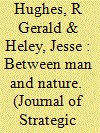

|
|
|
|
|
| Summary/Abstract |
This article argues for the continued relevance of the work and theories of the British Geostrategist Sir Halford J. Mackinder (1861-1947). It asserts that commentators and scholars who seek to marginalise Mackinder have too often dismissed his theories without setting them in the context of their continued endorsement in crucial areas of the globe. After 1945, despite his theories being tainted by association with Nazi Germany and Imperial Japan, both Moscow and Washington recognised the utility of Mackinder’s work and tailored policy accordingly. The end of Cold War saw Mackinder fall out of favour as his model was deemed unsuitable for policy analysis by a number of influential thinkers. It is argued here that, in recent years, the arena of international politics has seen a rehabilitation of Mackinder, accompanied by a resurgence of interest in Geopolitics. Finally, the piece examines those areas of the contemporary globe where Mackinder’s influence is greatest.
|
|
|
|
|
|
|
|
|
|
|
|
|
|
|
|
| 4 |
ID:
148100
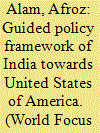

|
|
|
|
|
| Summary/Abstract |
India has to play a central role in turning the 21st century as Asian Century by strengthening its relations not only with its neighbouring and other Asian counties but also with global political and economic powers in a ‘grow together’ atmosphere without compromising its strategic interests in balancing the resurgent China and hostile Pakistan. In this backdrop, it now depends almost entirely on how India plays its cards to nurture its relationship with the US to play a meaningful role at the global arena.
|
|
|
|
|
|
|
|
|
|
|
|
|
|
|
|
| 5 |
ID:
124883
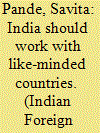

|
|
|
|
|
| Publication |
2013.
|
| Summary/Abstract |
India could reconsider its refusal of arms to the Afghan Army. The caveat here could be that these would be meant for the defence of Afghans only. This could be in the same vein as the assurance Americans have been giving India whenever they supply arms to Pakistan. Extending this logic, India can also station Indian troops around Indian and Indian-built institutions. Just as the USA has said that it would be maintaining a residual force in Afghanistan post-2014, India also can explore similar options in tandem with the USA, while supporting the "gradual, managed force reduction" of US-NATO forces as proposed at the 2012 Chicago summit.
|
|
|
|
|
|
|
|
|
|
|
|
|
|
|
|
| 6 |
ID:
138958
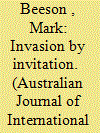

|
|
|
|
|
| Summary/Abstract |
Alliances continue to occupy a prominent place in the Asia-Pacific's security architecture. For many regional states such as Australia and Japan, their respective alliances with the USA are the unchallenged foundations of their security. But when the rise of China is causing major change in the region, and when many countries are increasingly reliant on China economically, is the region's network of alliances any longer appropriate or useful? This article reviews alliances in theory and practice, and argues that, while alliances are unlikely to disappear, their utility is nothing like as clear-cut as many of their supporters would have one believe.
|
|
|
|
|
|
|
|
|
|
|
|
|
|
|
|
| 7 |
ID:
151974
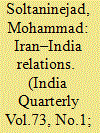

|
|
|
|
|
| Summary/Abstract |
With its enormous natural and human resources, a growing economy and adjacency to Iran’s security and strategic environment, India is considered one of the most important options with which the Islamic Republic of Iran can establish stable and reliable, if not strategic, relations. Despite this, all economic, trade and cultural capacities as well as diplomatic initiatives have not elevated the mutual relations higher than ‘cordial and friendly’. The present article discusses the reasons behind Indo-Iranian failure to create a once desired strategic partnership. The main idea is that differences in the direction and objectives of the relations between Iran and India, that is, balancing the United States for the former and cooperation with Iran besides the United States for the latter, have led to failure of the efforts to establish a strategic partnership. The theory of soft-balancing is used to analyse Iran–India relations when United States as a factor affecting bilateral relations is concerned.
|
|
|
|
|
|
|
|
|
|
|
|
|
|
|
|
| 8 |
ID:
115245
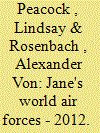

|
|
|
|
|
| Publication |
Surrey, IHS Global Limited, 2012.
|
| Description |
801p.
|
| Standard Number |
20500270
|
|
|
|
|
|
|
|
|
|
|
|
Copies: C:1/I:0,R:0,Q:0
Circulation
| Accession# | Call# | Current Location | Status | Policy | Location |
| 056806 | 358.4/PEA 056806 | Main | On Shelf | General | |
|
|
|
|
| 9 |
ID:
124873


|
|
|
|
|
| Publication |
2013.
|
| Summary/Abstract |
This article explores the possible long-term trajectory of America's "pivot" to the Asia-Pacific and its implications for Canada's security policy. It shows that Obama's pivot represents the beginnings of a strategic choice on "selective primacy," which, due to Washington's worrisome fiscal situation and push towards a more specialized force structure, promises to only deepen in the future. In the second half of the article, I examine how Canada will likely respond to America's more sustained strategic adjustment to the Pacific based on a reading of how the country traditionally adapts to American strategic preferences. The article concludes with some thoughts on an expanded Canadian effort at maritime diplomacy and the future of a Pacific-centric Royal Canadian Navy.
|
|
|
|
|
|
|
|
|
|
|
|
|
|
|
|
| 10 |
ID:
108718
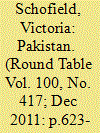

|
|
|
|
|
| Publication |
2011.
|
| Summary/Abstract |
Pakistan has been in the forefront of foreign policy debate for decades, at times condemned as a failing or failed state, also as a 'terrorist' state. As the country faces continuing pressure from the fallout of the war in Afghanistan as well as deepening internal strife, this article gives an overview of Pakistan's problems, highlighting growing anti-Western sentiment and emphasising the importance of institutional stability, as well as a resolution of 'the Kashmir issue'.
|
|
|
|
|
|
|
|
|
|
|
|
|
|
|
|
| 11 |
ID:
136251
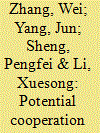

|
|
|
|
|
| Summary/Abstract |
China and the United States of America (US) are developing renewable energy concurrently. In this paper, we seek the opportunities for potential cooperation between these two countries based on the analysis of annual economic data. A mathematical model has been established to characterize correlations among GDP, carbon dioxide emissions, energy prices and the renewable energy cooperation index. Based on statistical analyses, such cooperation can promote economic development, reduce carbon dioxide emissions, improve the environment and realize green growth. If US monetary and technology resources and Chinese markets are combined, benefits can be mutually gained.
|
|
|
|
|
|
|
|
|
|
|
|
|
|
|
|
| 12 |
ID:
123706
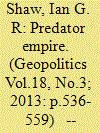

|
|
|
|
|
| Publication |
2013.
|
| Summary/Abstract |
This paper critically assesses the CIA's drone programme and proposes that the use of unmanned aerial vehicles is driving an increasingly "dronified" US national security strategy. The paper suggests that large-scale ground wars are being eclipsed by fleets of weaponised drones capable of targeted killings across the planet. Evidence for this shift is found in key security documents that mobilise an amorphous conflict against vaguely defined al-Qa'ida "affiliates". This process is legitimised through the White House's presentation of drone warfare as a bureaucratic conflict managed by a "disposition matrix". These official narratives are challenged by the voices of people living in the tribal areas of Pakistan. What I term the Predator Empire names the biopolitical power that digitises, catalogues, and eliminates threatening "patterns of life" across a widening battlespace. This permanent war is enabled by a topological spatial power that folds the distant environments of the affiliate into the surveillance machinery of the Homeland.
|
|
|
|
|
|
|
|
|
|
|
|
|
|
|
|
| 13 |
ID:
172522
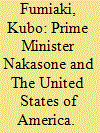

|
|
|
|
|
| Summary/Abstract |
Although it is commonly believed that as Prime Minister of Japan, Nakasone Yasuhiro focused diplomatic efforts on the United States, his first trip abroad as prime minister was to the Republic of Korea. In the 1950s, he was even a vocal critic of the US-Japan alliance. But he was different from many other politicians in reading books, traveling abroad to discuss issues with foreign leaders, and soliciting ideas and advice from intellectuals. In the end, he acquired mature views on how to fight the Cold War as well as maintain robust relations with the US. This article traces the evolving approach he had with the United States from the Occupation through the “Ron-Yasu” relationship during his prime ministership.
|
|
|
|
|
|
|
|
|
|
|
|
|
|
|
|
| 14 |
ID:
110164
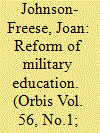

|
|
|
|
|
| Publication |
2012.
|
| Summary/Abstract |
When considering how to make the war colleges more effective, it should be remembered that first and foremost, the job of the war colleges is to educate students to make them better defenders of the United States of America and its interests and its allies around the world. However, the author gives many recommendations on how these colleges can better educate, rather than train.
It has been 25 years since the landmark 1986 Goldwater-Nichols Act reformed U.S. national defense. Part of that important legislation specifically mandated guidelines for military education, with intent to open the military culture and to encourage intellectual integration with civilians and among the services themselves. This was followed by the "Skelton Panel," chaired by Rep. Ike Skelton (D-MO). The idea behind both was simple, reflecting the classic wisdom that "the society that separates its scholars from its warriors will have its thinking done by cowards and its fighting done by fools.1 "Over a decade earlier, Admiral Stansfield Turner had similarly reformed the Naval War College (NWC), warning that if military officers could not hold their own with the best civilian strategists, the military would end up "abdicating control over its profession."
In 2010 the House Armed Service Committee issued a report titled Another Crossroads? Profession
|
|
|
|
|
|
|
|
|
|
|
|
|
|
|
|
| 15 |
ID:
172298
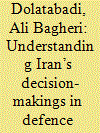

|
|
|
|
|
| Summary/Abstract |
The main question of the present study is: How is it that despite the West’s insistence on negotiation on Tehran’s missile programme and the possibility of sanctions being intensified in the event of Iran’s refusal, the Tehran authorities reject any negotiations in this regard? The findings of the present study indicate that Iranian political authorities, and in particular, the Iranian Leader, have a realistic view towards the country’s defence issue and continue to lay emphasis on such measures as increasing military capability, establishing a balance of power and self-sufficiency in arms manufacturing. Iran’s fears of replication of Iraq’s and Libya’s disarmament and the subsequent overthrow of the political systems of these governments, distrust in the West in the negotiations and the related consequences, lack of a strategic partner, the bitter experience of war with Iraq, and the continuous threats made by the USA and Israel have caused Iran to reject any request for negotiations about its missile programme.
|
|
|
|
|
|
|
|
|
|
|
|
|
|
|
|
| 16 |
ID:
122488
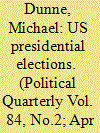

|
|
|
|
|
| Publication |
2013.
|
| Summary/Abstract |
The system for electing the President of the United States remains essentially as it was prescribed in the Federal Constitution drafted in 1787. The individual 50 states (plus the District of Columbia) are accorded a number of votes in the (so-called) Electoral College; each state's Electoral College vote is then attributed to the candidate gaining a plurality (most) of the popular vote in that state; and the candidate with a majority (50% + 1) of these aggregated Electoral College votes is declared the incoming president. What has changed have been the methods of nominating the candidates, chief of which are the political parties from the nineteenth century with their stage-managed quadrennial conventions and the primary/caucus campaigns from the twentieth century which precede and now determine the formal nomination. President Obama's 2012 re-election campaign showed both the crucial importance of the much-maligned Electoral College in winning the presidency and the demographic divisions hidden in the larger American political landscape.
|
|
|
|
|
|
|
|
|
|
|
|
|
|
|
|
| 17 |
ID:
112093
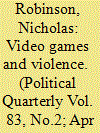

|
|
|
|
|
| Publication |
2012.
|
| Summary/Abstract |
This article explores the way that politicians and legislators have responded to concerns over the link between videogames and violence in the UK, particularly in terms of ensuring that inappropriate content remains inaccessible to minors. It explores the recent changes to the regulatory framework centred on videogames, arguing that the move to a universal statutory framework has implications that are more symbolic than real-policy is still underpinned by the 'precautionary principle' and the framework remains equally likely to be undermined by the actions of parents who ignore ratings and purchase age-inappropriate games for their children. Perhaps predictably, the political establishment has been unwilling to engage with this parental neglect, attributing it to 'ignorance' and 'the need for a simplification of the ratings system'. This paper argues that such responses are essentially a smokescreen used by governments which are understandably unwilling to take prosecutions into the home and retail space.
|
|
|
|
|
|
|
|
|
|
|
|
|
|
|
|
| 18 |
ID:
163918
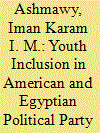

|
|
|
|
|
| Summary/Abstract |
The Arab Spring revealed that when the youth are marginalized, they can resort to informal political movements that may be characterized by extremism and criminality. However, when they join formal groupings, such as political parties, and are well utilized within them, they can become an active political force. This article explores the extent to which American and Egyptian political parties offer opportunities for youth inclusion in their structure and decision-making processes. By conducting semi-structured interviews with young members of the largest two Egyptian parties and the Democratic and Republican parties in the United States, the study argues that when young people develop a long-term interest in politics, they join political parties. Moreover, they are included in the party structures and decision-making processes when they are included in party activities and positions, as well as trusted, heard, and supported within the party. The existence of a national plan and political will may even encourage cross-party youth collaboration.
|
|
|
|
|
|
|
|
|
|
|
|
|
|
|
|
|
|
|
|
|